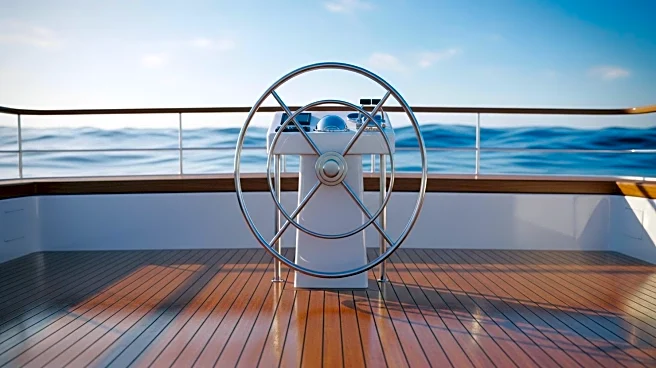What is the story about?
What's Happening?
The Maritime Cyprus 2025 Conference commenced in Limassol, focusing on the theme 'Unlocking the Future of Shipping.' The event gathered over a thousand participants from 35 countries, including heads of state, ministers, and industry leaders. The conference aims to address pressing challenges in the maritime sector, such as decarbonization, digitalization, and geopolitical uncertainties. European Commissioner for Sustainable Transport and Tourism, Apostolos Tzitzikostas, announced plans to present a European Industrial Maritime Strategy and a European Port Strategy during the Cyprus EU Presidency. These strategies aim to promote innovation, fair competition, clean technologies, and the development of ports as energy hubs for offshore wind and hydrogen. The conference also highlighted Cyprus's commitment to sustainability, with President Nikos Christodoulides announcing the digitalization of services within the Shipping Deputy Ministry and Cyprus's accession to the Hong Kong Convention for ship recycling.
Why It's Important?
The strategies announced by the European Commissioner are significant as they aim to balance environmental ambitions with economic realities, ensuring the maritime industry remains competitive and resilient. The focus on clean technologies and alternative fuels is crucial for reducing the industry's carbon footprint and aligning with global decarbonization goals. Cyprus's initiatives, such as digitalization and increased tonnage under its flag, demonstrate its leadership in maritime sustainability and competitiveness. These developments could influence broader European maritime policies and encourage other nations to adopt similar strategies, potentially leading to a more unified and sustainable approach to maritime operations across Europe.
What's Next?
As Cyprus prepares for its EU Presidency, maritime competitiveness and sustainable growth will be central to its agenda. The European Industrial Maritime Strategy and European Port Strategy are expected to be presented, potentially shaping future maritime policies across the EU. The conference discussions may lead to stronger regional cooperation on safety, efficiency, and digitalization, addressing global challenges like decarbonization and seafarer shortages. The international community is urged to pursue a just and equitable transition in shipping, with the IMO's long-term decarbonization objectives guiding future actions.
Beyond the Headlines
The conference discussions highlighted the need for a single global regulatory framework under the IMO to prevent overlapping regional schemes. This approach could streamline regulations and reduce compliance costs for shipowners, fostering innovation and investment in sustainable practices. The emphasis on collaboration between public and private sectors underscores the importance of inclusivity in maritime decision-making, ensuring that policies are developed with industry input. The focus on human capital and innovation as drivers of maritime transformation suggests a shift towards more sustainable and efficient industry practices.















